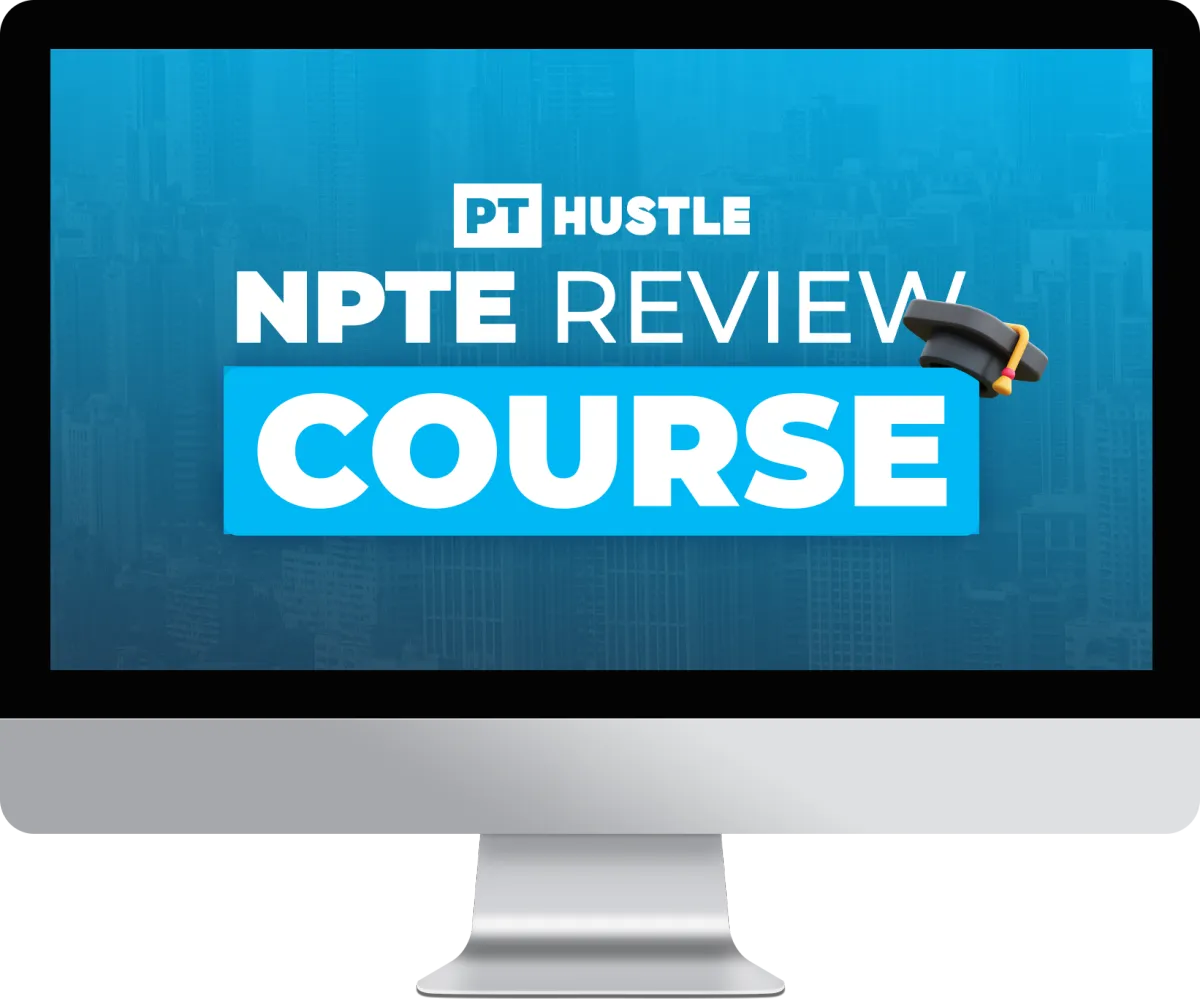Our NPTE Exam Prep Courses


NPTE Coaching Program
Ready to put all those failed NPTE exams behind you? Meet The NPTE Coaching Program. Get live weekly workshops, cheat sheets, dynamic lectures and full access to Coach K’s method for acing NPTE practice exams AND the real thing — all at your pace.


NPTE Review Course
If you know the material, but still have a hard time selecting the right answer, this course is for you. With an independent approach to content and test-strategy, this course provides the score and confidence boost you need before taking the PT exam.
CLICK HERE TO DOWNLOAD OUR TOP 10 MSK NPTE CHEATSHEETS CLICK HERE TO DOWNLOAD FREE NPTE CHEATSHEETS
Respect the Hustle
From study tips to lifestyle design, Dr. Rice and team have the info to help you up your game.

3 Information Retention Strategies to Study Better and Pass the NPTE
How many times have you spent all day studying only to wake up the next morning feeling as if you don’t remember any of it?
Trust us; it’s not you. It’s how you’re studying.
Today, Dr. Kyle Rice is sharing three powerful strategies for how to improve information retention by up to 90%.
Whether you’re a new PT student, are about to take the NPTE, or just want to improve your study habits, these simple strategies will change your life.
1. Teach It
While studying to become a physical therapist, Dr. Rice did what many of us do. He laboriously wrote and rewrote his notes. But he didn’t seem to be retaining the information any better as a result.
So he set out to develop better study skills, reading dozens of books and articles on the subject. And there was one information retention strategy that everyone seemed to recommend…That the best way to improve information retention is to teach concepts rather than focusing on memorization.
It was a total game-changer.
Which is why Coach K devotes a portion of his Coaching Program to effective strategies for teaching what you learn.
During a recent live session in the Helping PT Students & Grads Crush the NPTE Facebook group, he broke it down. “Does it have to be teaching it to a classroom? Absolutely not. You can teach it to yourself. You can teach it on a video like this. You can create a Facebook group and teach it. Whatever.”
The point is that teaching concepts forces you to understand them more fully, as well as explain them in your own words, which leads to increased memory retention.
Teaching new concepts doesn’t just help improve retention skills, either. If you recall from our conversation with Dr. Krystal Robles, realizing her study group often relied on her to explain concepts helped restore her confidence after failing the NPTE.
2. Review It
The second strategy for how to improve study habits and information retention? To review the material.
Ok, so you’re probably thinking, “I already do that.” Well, not exactly, says Dr. Rice, reflecting on his own time in school.
“I thought reviewing was all about seeing that same information over again,” he says. “That’s not an effective way to review!”
Instead of spending hours reading over your notes, Coach K recommends reviewing concepts frequently, for only a few minutes at a time.
“What this means is that the night after I see a concept, I review it for five or 10 minutes max. Then I review five to 10 minutes the next morning. My goal is not to just sit there and read the notes. My goal is to take that information that I remember and try to regurgitate it and teach it to myself.”
“You’re literally testing yourself in that moment,” he says.
Remember, the trick is to use review time to teach yourself the concept again, referencing your notes only as needed to jog your memory.
In other words, you’re connecting teaching with reviewing. And that brings us to Coach K’s third information retention strategy.
3. Connect It
One aspect of the NPTE that often trips people up is how the questions incorporate multiple concepts, which may or may not have been covered in different classes or semesters. But it’s important. Because on any given day, you’re going to apply a variety of interventions, treating a variety of issues, so you’re going to need to know how the concepts relate to each other.
“Any time I go through a concept, I’m always thinking about, ‘What can I connect this to? What does this have to do with anything.”
For example: “If I’m learning about adhesive capsulitis, well, what other place in the body has a capsule that may be inflamed?”
And it doesn’t matter what you’re learning about, whether it’s a pathology, an intervention, a special test, with nerves, etc.
“The secret is to always look for ways to connect the information,” says Dr. Rice. “Because once you make those connections, it’s kind of like you’re making new neural connections in your brain.”
You Have the Power to Increase Your Information Retention
Whether you’re studying for the NPTE or any other exam, these three information retention strategies will help you get better at studying right now:
Teach
Review
Connect
To hear Coach Kyle’s full talk on how to improve information retention, join the PT Hustle: Helping PT Students & Grads Crush The NPTE Facebook group, and check out the videos.
And for more help preparing for the NPTE, check out The PT Hustle.

3 Information Retention Strategies to Study Better and Pass the NPTE
How many times have you spent all day studying only to wake up the next morning feeling as if you don’t remember any of it?
Trust us; it’s not you. It’s how you’re studying.
Today, Dr. Kyle Rice is sharing three powerful strategies for how to improve information retention by up to 90%.
Whether you’re a new PT student, are about to take the NPTE, or just want to improve your study habits, these simple strategies will change your life.
1. Teach It
While studying to become a physical therapist, Dr. Rice did what many of us do. He laboriously wrote and rewrote his notes. But he didn’t seem to be retaining the information any better as a result.
So he set out to develop better study skills, reading dozens of books and articles on the subject. And there was one information retention strategy that everyone seemed to recommend…That the best way to improve information retention is to teach concepts rather than focusing on memorization.
It was a total game-changer.
Which is why Coach K devotes a portion of his Coaching Program to effective strategies for teaching what you learn.
During a recent live session in the Helping PT Students & Grads Crush the NPTE Facebook group, he broke it down. “Does it have to be teaching it to a classroom? Absolutely not. You can teach it to yourself. You can teach it on a video like this. You can create a Facebook group and teach it. Whatever.”
The point is that teaching concepts forces you to understand them more fully, as well as explain them in your own words, which leads to increased memory retention.
Teaching new concepts doesn’t just help improve retention skills, either. If you recall from our conversation with Dr. Krystal Robles, realizing her study group often relied on her to explain concepts helped restore her confidence after failing the NPTE.
2. Review It
The second strategy for how to improve study habits and information retention? To review the material.
Ok, so you’re probably thinking, “I already do that.” Well, not exactly, says Dr. Rice, reflecting on his own time in school.
“I thought reviewing was all about seeing that same information over again,” he says. “That’s not an effective way to review!”
Instead of spending hours reading over your notes, Coach K recommends reviewing concepts frequently, for only a few minutes at a time.
“What this means is that the night after I see a concept, I review it for five or 10 minutes max. Then I review five to 10 minutes the next morning. My goal is not to just sit there and read the notes. My goal is to take that information that I remember and try to regurgitate it and teach it to myself.”
“You’re literally testing yourself in that moment,” he says.
Remember, the trick is to use review time to teach yourself the concept again, referencing your notes only as needed to jog your memory.
In other words, you’re connecting teaching with reviewing. And that brings us to Coach K’s third information retention strategy.
3. Connect It
One aspect of the NPTE that often trips people up is how the questions incorporate multiple concepts, which may or may not have been covered in different classes or semesters. But it’s important. Because on any given day, you’re going to apply a variety of interventions, treating a variety of issues, so you’re going to need to know how the concepts relate to each other.
“Any time I go through a concept, I’m always thinking about, ‘What can I connect this to? What does this have to do with anything.”
For example: “If I’m learning about adhesive capsulitis, well, what other place in the body has a capsule that may be inflamed?”
And it doesn’t matter what you’re learning about, whether it’s a pathology, an intervention, a special test, with nerves, etc.
“The secret is to always look for ways to connect the information,” says Dr. Rice. “Because once you make those connections, it’s kind of like you’re making new neural connections in your brain.”
You Have the Power to Increase Your Information Retention
Whether you’re studying for the NPTE or any other exam, these three information retention strategies will help you get better at studying right now:
Teach
Review
Connect
To hear Coach Kyle’s full talk on how to improve information retention, join the PT Hustle: Helping PT Students & Grads Crush The NPTE Facebook group, and check out the videos.
And for more help preparing for the NPTE, check out The PT Hustle.
The PT Hustle Blog
Dominate the NPTE.
Get started on the road to passing the PT exam!


Dominate the NPTE.
Get started on the road to passing the PT exam!
Explore the mission behind PT Hustle and why our program is a wise investment.
Still unsure which course is right for you? Compare the benefits of our three options.
Podcasts, eBooks, and free cheat sheets are just some of the NPTE tools we offer.
Get free NPTE coaching through our podcast, NPTE Clinical Files. Hosted by Dr. Rice.
Learn everything from the best ways to prepare for the NPTE to the value of our program.
Success stories from PT students who enrolled in our prep courses and passed the exam.
Still have questions? Get the answers you need about PT Hustle in our FAQ section.
Interested, but need more information? Fill out our contact form and we’ll get in touch.

